From December 26th through December 31st, Daily Grindhouse is celebrating the rapid approach of 2020 with a look at films taking place during New Year’s Eve. So read on about some of our favorite movies that ring in January 1st with…

On New Year’s Eve, Monk Riley (Julius Harris), the broad-shouldered, regal publisher of Glance Magazine, is looking for a reporter to cover the impending arrival in Los Angeles of Blake Tarr, “the black Howard Hughes.” Riley can’t reach his top (white) reporter, Shawn North, so he makes the next call on his Rolodex, to Shawn’s assistant, the intrepid photojournalist Friday Foster. Her little brother Cleve (Tierre Turner), a precocious pre-teen with a side hustle of accumulating and reselling women’s perfumes and accoutrements, calls out to Friday that the “H.N.I.C.” is on the phone for her.
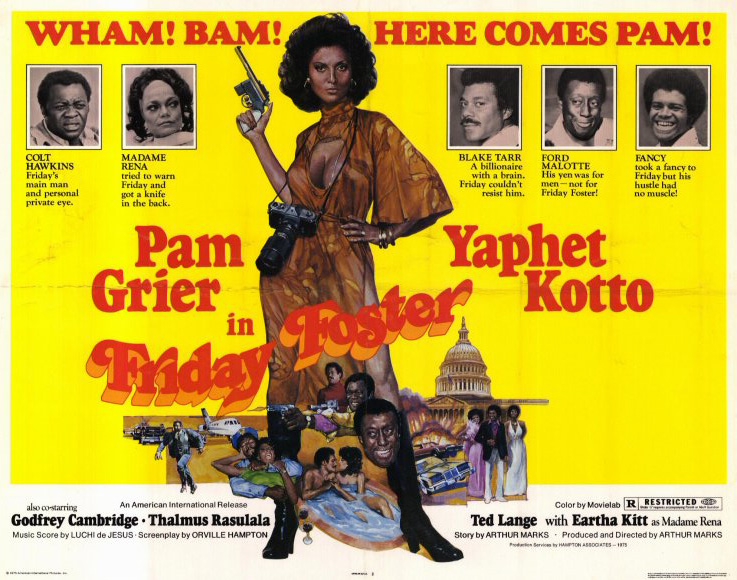
When Friday takes the call, Riley gives her the assignment, underlining with no small amount of low-key sexism that Friday is to take pictures only, and not to get involved. At that point Friday, who is played by Pam Grier, gets a look on her face, and stops just short of looking into the camera. This tells us all we need to know about Friday Foster as a character, but it also, if we know anything about the movie star playing her, plays as a laugh, because there’s no way a Pam Grier character is going to taker her “pretty little behind” and sit on the sidelines.

FRIDAY FOSTER was originally released on Christmas Day in 1975. Its inciting incident is set on New Year’s Eve, and the action continues within a two-month span and culminates around St. Valentine’s Day. The characters are weirdly specific about that latter date, in fact: Friday says, “St. Valentine’s Day is the day after tomorrow!” But these are merely signposts. There’s no major thematic reason why FRIDAY FOSTER would be set in the span between New Year’s and Valentine’s. I could spin something out of my ass to cover the stretch (“Friday is a new woman for a new era;” “Friday is more of a lover than a fighter”), but really, I chose this movie for our New Year’s Eve feature due to its story kicking off on New Year’s Eve, and otherwise because it gives me a fresh excuse to think and write about Pam Grier.
Though it’s mentioned infrequently as a result of the outsized impact she had on American popular culture, Pam Grier’s career as a leading lady was extremely short. The films that star Pam Grier as the leading character are as follows: COFFY (1973), FOXY BROWN (1974), SHEBA, BABY (1975), and FRIDAY FOSTER (1975). (JACKIE BROWN (1997) is an outlier.) Within two years, Pam Grier made four films that positioned her as the incandescent star that she should have been, and then that was mostly that. FRIDAY FOSTER is also notable as Pam’s final film for American International Pictures. The others were BLACK MAMA WHITE MAMA (1973), in which she shared billing with Margaret Markov, SCREAM, BLACULA, SCREAM (1973), in which she is heroic but also really cast as “the girl,” and BUCKTOWN (1975), an odd film chronologically in that it was post-COFFY and post-FOXY BROWN and released after SHEBA, BABY too. In BUCKTOWN Pam’s character is heroic and takes part in the action, but she’s also clearly playing “the girlfriend” to Fred Williamson’s lead character. It’s an entertaining enough film, but it’s one that hurts for not starring Pam first and foremost. BUCKTOWN was directed by Arthur Marks, who reteamed with Pam that same year for FRIDAY FOSTER.
We lost Arthur Marks in November of this year. It’s a major loss because he was really one of the finer American exploitation directors of the 1970s. I don’t know the man personally, but judging strictly off the basis of his films, it appears here was a straight white man who had sincere affection for the women and the black people who populated his movies. In the cinemaniac circles I run in, I don’t get the sense Marks is as fondly remembered as Jack Hill (COFFY and FOXY BROWN) or even William Girdler (SHEBA, BABY), to take the examples of the other directors who worked with Pam Grier during her first run at fame. But he had a facility with tough female characters (Tiffany Bolling’s Ellie in BONNIE’S KIDS; Marki Bey’s Carla in THE ROOMMATES) and assertive and charismatic black characters (Marki Bey’s Carla in THE ROOMMATES; Hari Rhodes’ Sgt. Jesse Williams in DETROIT 9000).
Arthur Marks is probably best known, if at all, for DETROIT 9000 (1973), which along with ACROSS 110th STREET (1972) and HICKEY & BOGGS (1972) was a precursor to the white-cop/black-cop buddy-film mini-genre which became ubiquitous after 48 HRS. (1982) in the following couple decades. Like the better films in the genre, it’s hardly timid about addressing the implicit racial tensions in such a partnership, though unlike so many mainstream Hollywood productions, far less pretentious about it. DETROIT 9000 was written by Orville Hampton, Academy-Award-nominated for ONE POTATO, TWO POTATO (1964), who reteamed with Marks for FRIDAY FOSTER. It’s another film from the era which touches on racial politics at the time. FRIDAY FOSTER may take on a little too much, and it may not run all that deep, but as an artifact, it still has tremendous value.
FRIDAY FOSTER surrounds Pam Grier with one of the deepest benches of talent of any comparable exploitation film, populating even peripheral roles with incredible black actors, including Yaphet Kotto, Carl Weathers, Eartha Kitt, Paul Benjamin, Jim Backus, Ted Lange, Godfrey Cambridge, Scatman Crothers, and Thalmus Rasulala. (Jim Backus isn’t black, but he’s in there.) Thalmus Rasulala plays the dashing and mysterious Blake Tarr, who Friday witnesses getting shot during an assassination attempt at the airport while she’s there snapping photographs.
Not long afterwards, Friday’s childhood friend (Rosalind Miles from SHAFT’S BIG SCORE!) is murdered while modeling at a fashion show hosted by Madame Rena (Eartha Kitt), apparently by some of the same men who made the attempt on Tarr’s life. The lead assassin is played by a young Carl Weathers. Yaphet Kotto plays Colt Hawkins, the private investigator who helps Friday put it all together, in a role that Fred Williamson could have played. Much as I love Fred, it’s somehow more interesting with Yaphet Kotto.

In one rooftop shoot-out with Carl Weathers, Colt suddenly pauses and asks himself, “What am I doing here?” It’s a nice meta moment for an actor who at that time was best known for playing “the scary black guy,” either as a straight-up villain (in LIVE AND LET DIE and TRUCK TURNER) or in a tongue-in-cheek satirical way (BONE). It’s also just plain funny. As warm a presence as Kotto was in ALIEN, he soon became typecast as rather stern authority figures, cops and feds, even in a film as raucous as MIDNIGHT RUN, so it’s a treat to see him having so much fun in FRIDAY FOSTER.

Carl Weathers, for his part, plays a near-mute killer with a predilection for loud plaid suits in FRIDAY FOSTER – sort of an odd early role for such a lovable screen presence (and another example of an performer who should have been a much bigger star, though he’s aged into a fascinating character actor.) He does get one of the more memorable moments in the film, though – after Cleve lets Weathers’ character Yarbro into the apartment, Yarbro walks in on Friday taking a shower, leading him on a chase through the hallways wearing nothing but a towel and eventually forcing him to back off without a single gunshot fired.
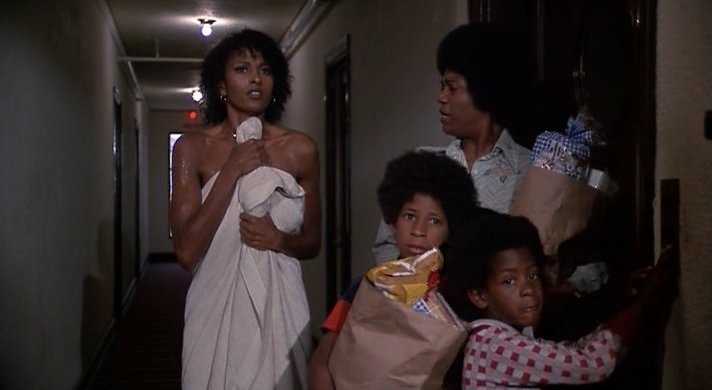
The rest of the cast provides an intriguing spectrum of 1970s black archetypes – some very stereotypical, others more nuanced. Eartha Kitt is typically florid and striking as Madame Rena, purely iconic in a relatively abbreviated role. Ted Lange, most recognizable as the bartender from The Love Boat, plays a mega-clichéd pimp role – and one with no apparent connection to the rest of the movie; he just frequently approaches Friday to try to recruit her into his stable – with almost self-deprecating energy. Scatman Crothers plays a perverted reverend who basically has the same interest in Friday Foster, but he’s the type of actor who can make “a dirty old man” almost endearing. Godfrey Cambridge, at the time a gigantic comedy star, is a more complicated case. Here he plays Ford Malotte, a well-connected go-between who may or may not have valuable information for Friday and Colt as to why Blake Tarr was targeted. Cambridge plays a flamboyantly gay man, and Kotto’s character is visibly repulsed by him. On the one hand, it’s a stereotype that would rightly never fly in 2019, and the homophobia is unpleasant but sadly realistic. On the other hand, how many 1970s films had scenes set in gay night clubs? This is the way exploitation films can provide a window into an era that mainstream films did far less often.
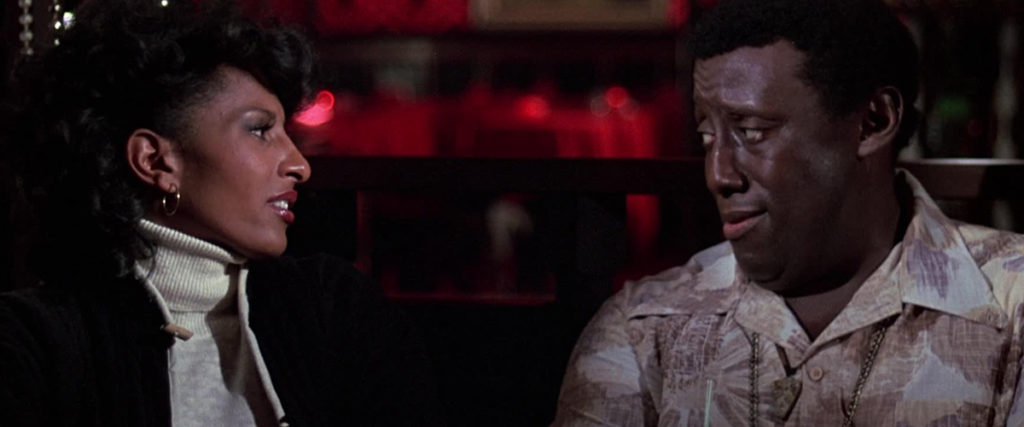
On the other end of the spectrum, FRIDAY FOSTER has Paul Benjamin (DO THE RIGHT THING), a terrific actor we lost in June of this year, as the unity-promoting Senator David Lee Hart, and Thalmus Rasulala as the debonair billionaire Blake Tarr, both playing aspirational black figures who both end up being potential love interests for Friday Foster. As a film, FRIDAY FOSTER has a little too much plot, and it doesn’t end up having enough time to develop any of its characters outside the one in the title, but if it falls short of being a quote-unquote great film, getting to see this many wonderful performers in their prime makes it a different kind of treasure.

And no treasure gleams in FRIDAY FOSTER nearly as brightly as Pam Grier. In this movie, she sparkles. The cinematography by Harry J. May (THE ROOMMATES, DETROIT 9000, J.D.’S REVENGE) is unsplashy and functional. There’s not much art to the visual elements of the movie. The camera captures the action, and that’s about it – except when it turns to Pam Grier.
This is unquestionably a movie star, outfitted in Yves Saint Laurent and luminous, whether she’s running from a car down a storm tunnel or looking sad at a funeral at a cemetery or surrounded by flowers sent by multiple admirers. I’m not just talking about looks – Pam appears to be enjoying herself on screen in a way that by definition doesn’t register in her better-known roles. Coffy and Foxy and Sheba are all fighters. Friday is a lover. She’s a different kind of character. In FRIDAY FOSTER, she chases the story, but runs from a fight. Late in the film, when she picks up a dropped pistol and shoots down a hired gun in self-defense, it plays as a surprise to Friday and even maybe to the audience. By that point, we’ve almost forgotten how much ass Pam Grier can kick, and come to see her as Friday Foster, brave but no avenging superwoman. Again, it’s a different role. She should have gotten to play many others, because she could have.
The image of Pam wielding a shotgun in COFFY or pointing a handgun at the camera in FOXY BROWN are so awesome and definitive that maybe most people didn’t want anything else from her. But that’s not all she was, and that’s not all she is. Pam Grier is a great actor along with being an iconic movie star. Her comeback in JACKIE BROWN wasn’t charity. It was a long-overdue return to above-the-title status for a still-undervalued talent. It’s a travesty that so few filmmakers have managed to take advantage of her abilities. Even now, on the ABC comedy Bless This Mess, Pam is giving a classic screwball performance. That series isn’t centered around Pam so it’s not really to my own interest, and it’s certainly not going to please anyone looking for ass-kicking, but it does make my point:
Pam Grier was always more than the fierce image that you and I love so much. In COFFY and in FOXY BROWN and even in SHEBA, BABY, Pam Grier proved she could do whatever Clint Eastwood could do. In FRIDAY FOSTER, Pam Grier proved she could do anything that Barbara Stanwyck or Audrey Hepburn or Julia Roberts or Reese Witherspoon could do. Though I’m dearly grateful for what we do have (so far), the fact that we don’t have more than four or five movies starring Pam Grier front and center is a failure on the part of movies in general. Maybe it’s fair to say that the movies have never been big enough for Pam Grier.
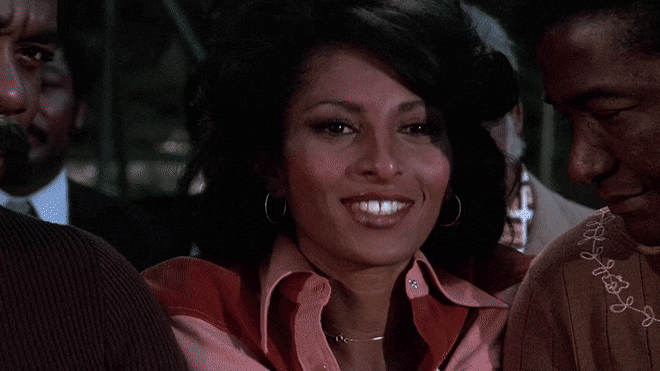
- [THE BIG QUESTION] WHAT’S YOUR FAVORITE FEMALE ENSEMBLE IN MOVIES? - July 22, 2016
- [IN THEATERS NOW] THE BOY (2016) - January 24, 2016
- Cult Movie Mania Releases Lucio Fulci Limited Edition VHS Sets - January 5, 2016
Tags: Arthur Marks, Carl Weathers, Comic Strips, Eartha Kitt, Godfrey Cambridge, Harry J. May, Jason Bernard, Jim Backus, Jim Lawrence, Julius Harris, Orville H. Hampton, pam grier, Paul Benjamin, Scatman Crothers, Ted Lange, Thalmus Rasulala, Yaphet Kotto

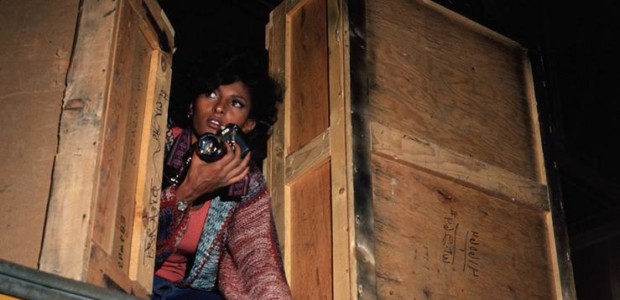




No Comments